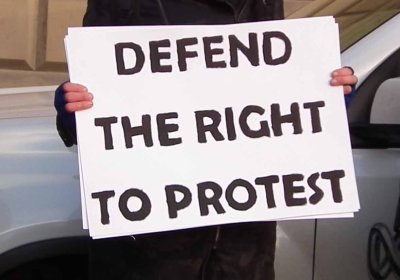Fossil Free UTas began a sit-in on October 14 outside the office of University of Tasmania's vice-chancellor, Peter Rathjen. The sit-in lasted a marathon 15 days.
The University of Tasmania has not yet committed to divesting from fossil fuels, but negotiations between the university and Fossil Free UTas are now underway.
The sit-in gained community awareness and support for the campaign. The students received national and international media attention, and their actions sparked similar campaigns in other parts of the country.
nipaluna/Hobart
Resistance: Young Socialist Alliance (RYSA) released the following statement on October 27 in support of the Fossil Free UTas occupation.
The following day Fossil Free UTas announced that they were ending the occupation and restarting negotiations after two days of productive meetings with the university management.
* * *
A student occupation demanding that the University of Tasmania (UTAS) divest its $300 million portfolio from the fossil fuel industry has entered its second week.
The sit-in outside the university vice-chancellor's office began on October 14, and is part of a nationwide campaign calling on other universities to do the same.
Fossil Free UTAS released a statement on October 19 saying: “We are here to demand that the university gets off fossil fuels because it will save students' money today and because it is the morally right thing to do.”
A United Patriots Front (UPF) rally of about 20 people was met by 200 Say No to Racism protesters and about 25 police in Hobart on July 19.
The UPF rally moved from Franklin Square, through the Elizabeth Street Mall to the ABC building and concluded at the Domain Rose Gardens.
Say No to Racism protesters included Greens, Socialist Alliance, anarchists, local musicians, and people who had "never been to a rally before".
Say No to Racism protesters disrupted the UPF rally at each stopping point and as they marched on the street.
Frack Free Tasmania held a public meeting on February 18 at Sustainable Living Tasmania to warn about possible exploration for shale oil and gas in the island state. The current moratorium on fracking in Tasmania is due to end on March 31.
The government put out an issues paper which received 157 submissions, 90% of which were opposed to fracking being allowed in the state. The government responded to the review on February 26 by extending the moratorium until 2020.
Several hundred Aboriginal community members and their supporters gathered on Hobart parliament house lawns to mark Invasion Day on January 26. There was a one minute silence observed whilst a wreath was slowly walked down two rows of those who gathered and placed on the steps to parliament house.
People were welcomed to country and reminded that the Aboriginal people do not recognise today as Australia Day, that they do not celebrate this day, and that their land was stolen, that they will never give up and will never go away.
Public sector unions in Tasmania held a two-hour strike across the state on November 27 to protest against the job cuts planned by the state Liberal government.
About 10,000 workers from 11 unions attended stop-work rallies at 18 sites. This included about 5000 people who rallied at Parliament House in Hobart and 2000 who gathered at the Inveresk Tramsheds in Launceston.
The rally in Burnie had to move out of the Arts and Function Centre to accommodate all the striking workers.
Tasmania’s Liberal government has amended its anti-protest bill to allay fears from concerned groups who say the laws are undemocratic and a threat to free speech.
The laws were passed in the state’s Upper House on October 30, and will be further amended by a committee.
A coalition of more than 20 community groups, including unions, the Tasmanian Aboriginal Centre, The Wilderness Society and the Australian Lawyers Alliance, released a joint statement urging parliamentarians to drop the Bill.
The Tasmanian Liberal government released its first budget on August 28. About 1500 people protested outside Parliament House on the same day to voice their opposition to the government’s plans.
The budget will cut 700 full-time jobs from the public sector and freeze public sector wages for at least one year.
School attendant and United Voice member Ken Martindale addressed the rally about the impact the pay freeze will have on low-income families in Tasmania, saying that bills will go up each year even if pay does not.
More than 300 concerned citizens took part in a peaceful people’s picket on August 19 at Tasmania’s parliament house to protest against a bill that would ban the right to protest.
The Workplaces (Protection from Protesters) Bill, introduced by the state Liberal government, passed Tasmania’s lower house in June. It is due to be debated in the upper house in late October. The bill makes it an offence to hold a protest that prevents business activity. Protesters can be given on-the-spot fines of $2000. Three-month mandatory jail sentences will apply for second offences.
About 5000 people protested outside Parliament House in Hobart on June 14 to call for the protection of Tasmania’s World Heritage forests.
The World Heritage Committee unanimously approved the extension of 120,000 hectares of new reserves to the Tasmanian Wilderness World Heritage property at a meeting in June last year. The forests were judged to have met all four natural heritage criteria.
The Tasmanian Aboriginal community and its supporters were outraged over the Aboriginal Heritage Protection Bill that was rushed through the lower house on November 13.
Brian Wightman, minister for environment, parks and heritage, tabled the bill, which will now proceed to the upper house. This bill is intended to replace the outdated and racist Aboriginal Relics Act.
- Previous page
- Page 3
- Next page









